News
Kenya 2027: Ruto’s defiance on power transfer fuels talk of a cornered presidency
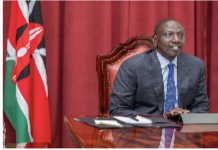
President William Ruto’s declaration that he won’t relinquish power to the opposition has intensified fears of democratic erosion and raised questions about whether he is beginning to panic.
Speaking on 17 June in the Rift Valley town of Naivasha, Ruto ridiculed his opponents as “tribalists with no plan” and appeared to mock the idea of conceding defeat. “We cannot hand over leadership to such people,” he told supporters in the west of the capital, Nairobi. However, he later added that leadership is not defined by how many terms one serves, but critics say the damage is already done.
His comments have ignited fears that the president, who campaigned as a reformer, is now laying the groundwork for a disputed election and an unconstitutional power grab. To many Kenyans, his remarks crossed the line. Critics say they signal not just contempt for the opposition, but for constitutional democracy itself.
“Kenya is a constitutional democracy, not your empire,” said constitutional lawyer Willis Otieno, stressing that under the Kenyan constitution, the peaceful transfer of power is not optional: “If Ruto loses and refuses to hand over, the inauguration will go on with or without him.”
Under the Assumption of the Office of President Act, once the Independent Electoral and Boundaries Commission (IEBC) declares a winner and the Supreme Court affirms it, the handover must proceed. If the outgoing president boycotts the ceremony, his absence won’t invalidate the transition.
If Ruto refuses to hand over the ceremonial sword and Constitution — symbols of executive authority — he will become the first Kenyan leader since independence in 1963 to flout this democratic ritual.
A presidency under pressure?
Analysts say behind Ruto’s bravado lies a growing sense of unease ahead of the next election. The economy is teetering under the weight of public debt and high cost of living, protests are surging, and a more unified opposition is beginning to emerge.
Ruto may have delivered on some key policy interventions, but poor communications, economic pain, and police brutality have made him deeply unpopular
His former deputy, Rigathi Gachagua, has teamed up with political heavyweights including Kalonzo Musyoka, Eugene Wamalwa, Martha Karua and Fred Matiang’i to forge a united front. Gachagua was quick to respond to the president’s remarks: “It’s good that Ruto has admitted he will be ousted,” he told a rally in Kirinyaga county.
At the same time, Ruto allies have made public comments that further inflamed concerns. “Even if he does not get enough votes, we shall add him more,” said Oscar Sudi, MP for Kapseret. Senate majority leader Aaron Cheruiyot added, “It is our responsibility to uphold the tradition of two-term presidencies.”
The rhetoric has raised fears that the 2027 election may not be fought on a level playing field or respected if lost.
The Gen-Z factor
For many young Kenyans, Ruto’s words seem to confirm a broader shift away from democratic norms. On 17 June—the same day he made his remarks—police opened fire on peaceful Gen-Z protesters in Nairobi, following the death in custody of 31-year-old blogger Albert Ojwang. Shocking footage, including a protester being shot at close range, quickly went viral.
Kenya is a constitutional democracy, not your empire
Amnesty International Kenya called it “a dark day for the right to protest”, accusing the state of deploying “violent groups with support from the very authorities meant to protect us”.
Gachagua condemned the brutality, calling it “one of the lowest moments in our post-independence history”, and accused Ruto of turning Kenya into “a pariah state”.
The protests are the latest expression of youth-led frustration over rising inequality, police brutality and the president’s perceived betrayal of his 2022 campaign promises.
After the 2024 Finance Bill protests, Ruto sought détente with veteran opposition leader Raila Odinga, co-opting parts of his ODM party into government. But even Raila’s support or silence may not be enough to rescue the president’s battered image. ODM Secretary-General Edwin Sifuna is among those unconvinced that an alliance would help. “Ruto has lost the people. Even if Raila supports him, he will still lose,” Sifuna said.
Analysts agree that the opposition still lacks cohesion, but say a credible challenger like Matiang’i, the former interior minister, could mount a serious campaign. “Ruto may have delivered on some key policy interventions,” says political analyst Dismas Mokua, “but poor communications, economic pain, and police brutality have made him deeply unpopular”.
A stress test for Kenyan democracy
Ruto’s comments may have been intended to project strength, but many say it instead exposed his growing vulnerability.
With the economy fragile, opposition unity on the rise and youth protests building momentum, the real question is no longer just whether Ruto can win a second term but whether Kenya’s democracy can survive the pressure.
“Ruto has shot himself in the foot,” says governance expert Torosterdt Alenga. “It’s clear the handover of power could be contested. His allies are rattled and for good reason. 2027 is no longer a sure thing.”
News
Puntland Executes Woman for Murder of 14-Year-Old Girl
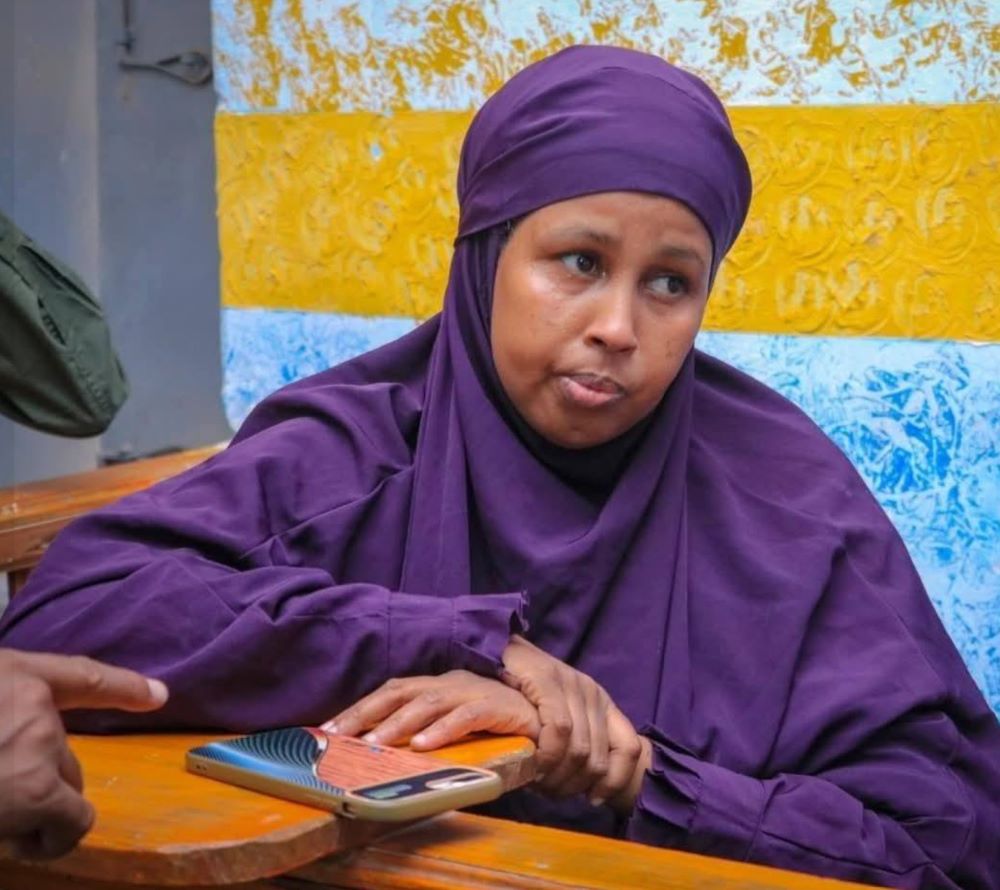
Puntland Executes Woman for Murder of 14-Year-Old Girl
Authorities in Puntland, a semi-autonomous region of Somalia, have executed a woman convicted of murdering a 14-year-old girl, in a rare case in which the death penalty was carried out against a female offender.
The convict, Hodan Mohamud Diiriye, 34, was executed by firing squad on Tuesday in Galkayo, the capital of Mudug region, after a court found her guilty of beating a teenage girl to death.
The victim, identified as Saabirin Saylaan, had been working as a domestic helper in Diiriye’s household.
Her killing in November triggered widespread protests in Galkayo and renewed calls for stronger child protection measures in the region.
Officials said the execution was carried out under qisas, an Islamic legal principle that allows the family of a murder victim to demand capital punishment instead of accepting financial compensation.
Mudug State Governor, Faysal Sheikh Ali, confirmed that members of both the victim’s family and the convict’s family were present during the execution.
A regional decree mandates the enforcement of Islamic law in murder cases, according to Puntland authorities.
Officials also said the execution marked the first time in more than a decade that a woman had been put to death under a retaliatory sentence in Puntland.
The last known execution involving a woman occurred in 2013, when 13 members of the Islamist militant group, al-Shabab, including one woman, were executed for their role in the killing of a prominent Islamic cleric, authorities said.
Investigations revealed that Saabirin, who was orphaned at a very young age after losing both parents, had been living with Diiriye’s family for about two months before her death.
Police said the teenager had suffered repeated physical abuse during that period.
Digital evidence recovered during the investigation reportedly showed a pattern of sustained violence, some of which circulated publicly ahead of the trial.
A post-mortem examination found that the victim sustained multiple injuries consistent with prolonged abuse, authorities said.
As details of the case emerged, public outrage intensified, with hundreds of women and youths staging protests across Galkayo, demanding justice for the victim and accountability for those involved.
Community leaders, activists and civil society groups have since renewed calls for stronger legal protections for children and domestic workers, who they say remain particularly vulnerable to abuse in Somalia.
The case has drawn national attention to the often-hidden problem of child abuse, especially within domestic and extended family settings, where such cases frequently go unreported.
News
Muammar Gaddafi’s Son, Saif al-Islam, Reportedly Shot Dead in Libya

Muammar Gaddafi’s Son, Saif al-Islam, Reportedly Shot Dead in Libya
Saif al-Islam Gaddafi, son of Libya’s former leader, Col. Muammar Gaddafi, has reportedly been shot dead in circumstances that remain unclear, Libyan media sources said on Tuesday.
The death of the 53-year-old politician was confirmed by the head of his political team, according to the Libyan News Agency.
However, conflicting accounts have emerged over the circumstances surrounding his death.
His lawyer told the AFP news agency that Saif al-Islam was assassinated at his residence in the city of Zintan by a “four-man commando” unit.
The lawyer did not disclose who may have been responsible for the killing.
In a separate version of events, Saif al-Islam’s sister told Libyan television that he died near Libya’s border with Algeria.
Saif al-Islam Gaddafi was long regarded as the most powerful and feared figure in Libya after his father, who ruled the country from 1969 until he was ousted and killed during a popular uprising in 2011.
Born in 1972, Saif al-Islam played a prominent role in Libya’s rapprochement with Western nations from around 2000 until the collapse of the Gaddafi regime.
Despite holding no official government position, he wielded significant influence and led high-level negotiations on behalf of his father.
These efforts included talks that culminated in Libya abandoning its nuclear weapons programme, a move that led to the lifting of international sanctions and restored diplomatic ties with Western countries.
At the time, Saif al-Islam was widely portrayed as a reformist figure and the acceptable face of a changing Libya.
Following the fall of his father’s government, Saif al-Islam was accused of playing a key role in the violent repression of anti-government protests in 2011.
He was subsequently captured and detained by a militia in Zintan, where he spent nearly six years in custody.
The International Criminal Court sought his extradition to face charges of crimes against humanity related to the suppression of the uprising.
In 2015, a court in Tripoli sentenced him to death in absentia for his alleged role in the crackdown, although the ruling was rejected in eastern Libya.
He was released in 2017 by a militia in Tobruk under an amnesty law enacted by authorities in the east of the country.
Since the overthrow of Muammar Gaddafi, Libya has remained deeply divided, with rival governments and numerous armed groups controlling different parts of the country.
Although Saif al-Islam had repeatedly denied any ambition to succeed his father, insisting that power was “not a farm to inherit,” he re-emerged on the political scene in 2021 when he announced his intention to contest the presidency.
That election was later postponed indefinitely, prolonging Libya’s political uncertainty.
As of Tuesday, Libyan authorities had yet to issue an official statement clarifying the circumstances surrounding his reported death.
News
DA Leader Steenhuisen to Step Down, Raising Fresh Uncertainty Over S’africa Coalition

DA Leader Steenhuisen to Step Down, Raising Fresh Uncertainty Over S’africa Coalition
Leader of South Africa’s Democratic Alliance (DA), John Steenhuisen, has announced that he will not seek re-election when the party holds its leadership contest in April, a decision that could unsettle the country’s fragile coalition government.
The DA, South Africa’s second-largest political party, entered into an unprecedented coalition with its long-time rival, the African National Congress (ANC), in 2024 after the ruling party lost its parliamentary majority for the first time since 1994.
Steenhuisen, who assumed leadership of the pro-business DA in 2019, currently serves as Minister of Agriculture in President Cyril Ramaphosa’s coalition government.
The 49-year-old politician had been widely expected to contest the leadership position again, but reports suggest he was compelled to abandon his bid amid a series of internal controversies within the party.
Confirming his decision at a press conference, Steenhuisen said he would devote his full attention to his ministerial responsibilities for the remainder of the administration’s tenure.
“For the rest of this term of office, I will focus all of my time and energy as Minister of Agriculture on defeating the most devastating foot and mouth disease outbreak our country has ever seen,” he said.
His decision has raised concerns about the future direction of the DA and the potential implications for the stability of the ANC-DA coalition, which has faced criticism and resistance from factions within both parties.
The DA has yet to announce a successor or provide further details on the leadership transition process.
-
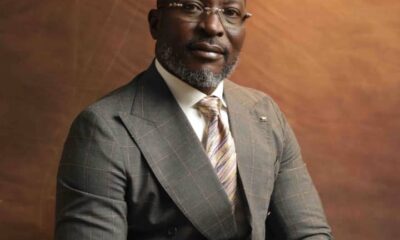
 Milestone4 days ago
Milestone4 days agoChief Chukwuma Johnbosco and the Making of a Purpose-Driven Leader
-
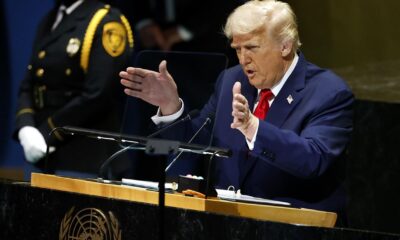
 News4 days ago
News4 days agoUS Sends Troops to Nigeria Over Rising Terror Threats
-

 Sports5 days ago
Sports5 days agoEx-Sri Lanka Star Jayasuriya Named in USA Squad for T20 World Cup
-

 Sports5 days ago
Sports5 days agoLens Edge Le Havre to Reclaim Ligue 1 Top Spot
-

 Sports5 days ago
Sports5 days agoJustin Rose Sets 36-Hole Record, Opens Four-Shot Lead at Torrey Pines
-
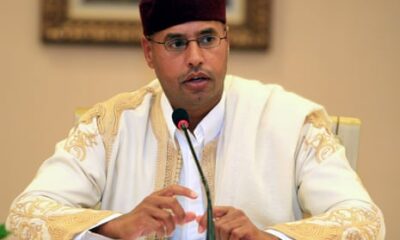
 News4 days ago
News4 days agoMuammar Gaddafi’s Son, Saif al-Islam, Reportedly Shot Dead in Libya






















